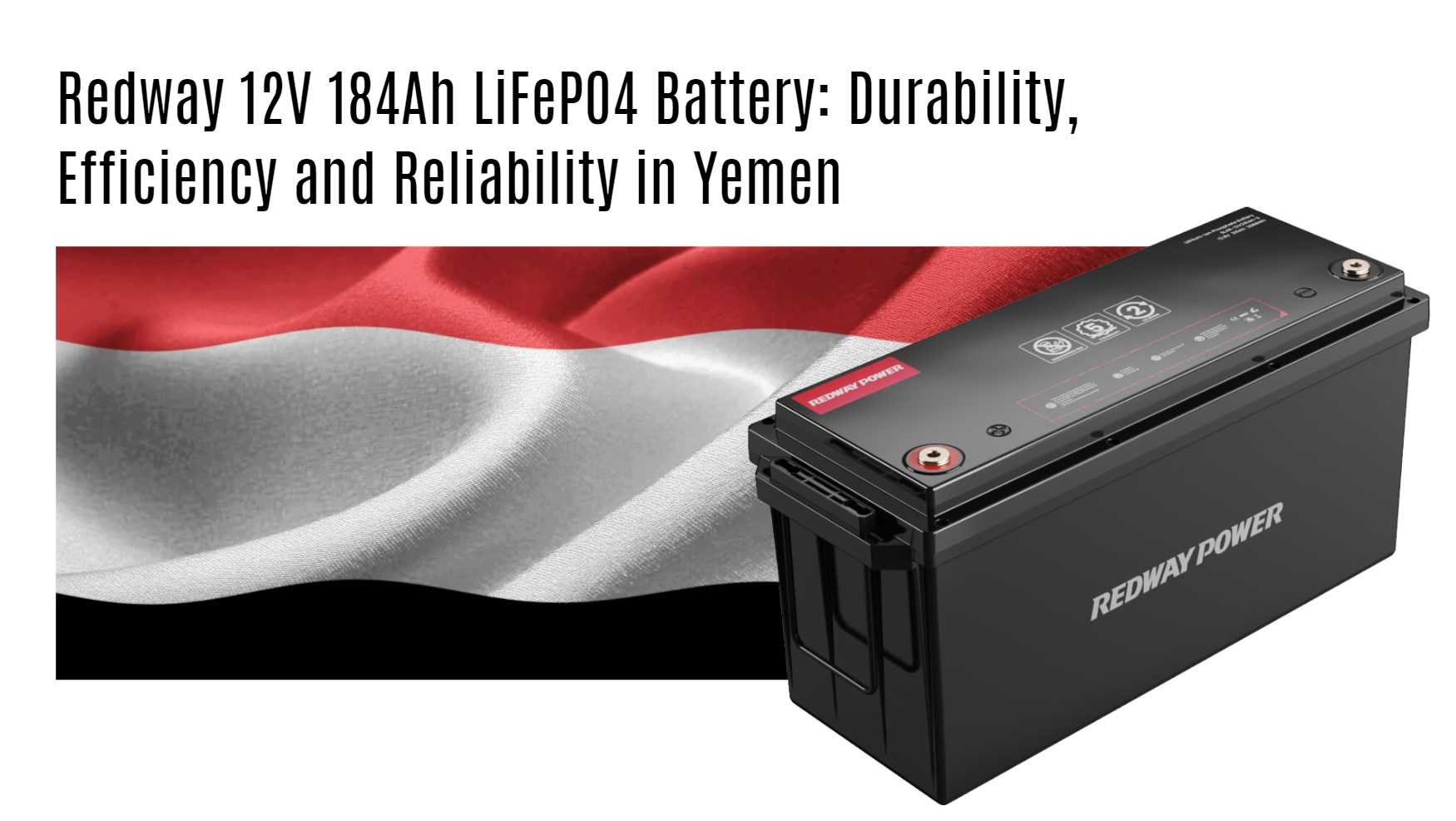Are you sick of having to buy new batteries all the time? The Redway 12V 184Ah LiFePO4 Battery is the only option! Yemen has seen a surge in sales of this powerful battery due to its dependability and longevity. Long-term cost savings are guaranteed, and because to its environmentally friendly technology, you will also be helping the environment. Let us examine why this battery is essential for everyone trying to charge electronics effectively and efficiently.
The Redway 12V 184Ah LiFePO4 Battery
In terms of batteries, the Redway 12V 184Ah LiFePO4 Battery is revolutionary. Constructed using premium components and cutting-edge technology, it offers extended battery life for every gadget you own. Because it is made especially for deep cycle applications, this battery is ideal for use in off-grid systems, boats, and recreational vehicles.
The Lithium Iron Phosphate (LiFePO4) chemistry of this battery distinguishes it from other products on the market. LiFePO4 batteries are more durable and efficient than conventional lead-acid batteries. Comparatively speaking, they are smaller and weigh less than their counterparts. Lithium LiFePO4 Battery, 12V, 180Ah The Redway 12V 184Ah LiFePO4 Battery’s resilience to high temperatures without sacrificing performance or capacity is yet another fantastic attribute. -20°C to 60°C (-4°F to 140°F) is its operating temperature range, which makes it perfect for usage in colder climes.
Wholesale lithium golf cart batteries with 10-year life? Check here.
With respect to comparable batteries available on the market today, the Redway 12V 184Ah LiFePO4 Battery delivers unmatched performance and longevity. Because of its environmentally friendly design, it is a great option for people who want to use less energy while still obtaining dependable electricity wherever they go.
Why the Redway 12V 184Ah LiFePO4 Battery is a Bestseller in Yemen
Several factors have led to the Redway 12V 184Ah LiFePO4 Battery becoming a blockbuster in Yemen. To begin with, the battery has a reputation for having a longer lifespan than conventional lead-acid batteries. This makes it an affordable choice for people and companies searching for dependable power storage solutions.
Want OEM lithium forklift batteries at wholesale prices? Check here.
Furthermore, the battery’s lightweight construction makes installation and transportation simple, which is crucial in isolated locations with little access to electricity. Yemen and other hot regions are perfect places to use the Redway 12V 184Ah LiFePO4 Battery since it provides excellent performance even in the most intense temperatures.
Additionally, consumers can rest easy knowing that their investment is shielded from harm from abuse or accidents thanks to the battery’s safety features, which include thermal regulation and overcharge protection. Because of these special qualities, consumers in Yemen who value dependability, simplicity, and safety in their power storage solutions highly regard the Redway 12V 184Ah LiFePO4 Battery.
How the Redway 12V 184Ah LiFePO4 Battery benefits users
The Redway 12V 184Ah LiFePO4 Battery is a game-changer for users who are always on-the-go and need a reliable power source. It benefits users in numerous ways, making it an excellent choice for those seeking high-quality energy storage solutions.
Firstly, the Redway 12V 184Ah LiFePO4 Battery has an incredibly long lifespan compared to traditional lead-acid batteries. With a service life that is over ten times longer and the ability to go through more charge cycles, this battery can save you money and reduce downtime in the long run.
Secondly, Its lightweight design enables easy transportation between locations without compromising on performance or capacity. Whether you’re using it for camping trips or powering your RV, this battery will provide ample power while taking up minimal space.
Thirdly, the Redway 12V 184Ah LiFePO4 Battery is also environmentally friendly due to its non-toxic components that do not harm ecosystems if disposed of properly. This feature makes it an environmentally friendly option that aligns with sustainable living practices.
The Redway 12V 184Ah LiFePO4 Battery offers exceptional value and convenience for users looking for a dependable power source that lasts longer than standard batteries while being environmentally conscious at the same time.
Conclusion
The Redway 12V 184Ah LiFePO4 Battery is undoubtedly a bestseller in Yemen for several good reasons. Users find it dependable, long-lasting, and effective for their high-performance power needs.
Its advanced technology and modern design distinguish it from conventional batteries available in the market. Its longer lifespan compared to lead-acid batteries and consistent voltage output make it a perfect option for upgrading energy storage systems.
In a time when renewable energy sources are gaining importance, owning a trustworthy battery such as the Redway 12V 184Ah LiFePO4 Battery is crucial. Whether you use it to power your home or business with solar panels or as a backup during emergencies, this battery offers peace of mind with its reliable energy source.
For those thinking about getting a new battery or upgrading their current one, the Redway 12V 184Ah LiFePO4 Battery is the ideal choice. Given its innovative features and widespread user satisfaction globally, especially in Yemen, this battery is set to remain highly sought after beyond 2024.
FAQs
What is the cut off voltage for a 3.2 V LiFePO4 battery?
- Cut-off voltage: The cut-off voltage refers to the minimum voltage at which a LiFePO4 battery should be discharged to prevent damage or reduction in its lifespan. For a 3.2 V LiFePO4 battery, the safe cut-off voltage is typically between 2.5 V and 3.0 V per cell.
- Effects of over-discharging: Discharging the battery below the safe cut-off voltage can lead to irreversible damage and reduce its overall capacity over time. It is important to monitor the battery’s state-of-charge and use a reliable battery management system to prevent over-discharging.
- Ensuring longevity and performance: By adhering to the recommended cut-off voltage and properly managing the battery’s state-of-charge, you can ensure the longevity and optimal performance of your 3.2 V LiFePO4 battery.
- Battery management system: Using a reliable battery management system is essential for monitoring the battery’s voltage and preventing over-discharging. A battery management system helps maintain the battery’s health and maximizes its lifespan.
What is the maximum voltage of LiFePO4 3.2 V?
The maximum voltage of a LiFePO4 (Lithium Iron Phosphate) battery is typically 3.2 volts per cell. This applies to individual LiFePO4 cells as well as batteries with different configurations, such as 12V, 24V, and 48V systems. The fully charged voltage can vary slightly depending on the specific battery manufacturer and model. It is important to refer to the battery manual or specifications provided by the manufacturer for accurate information on charging parameters and voltage ranges.
Can I mix 100Ah and 200Ah batteries?
- Understanding battery capacity: Battery capacity, measured in ampere-hours (Ah), determines how long a battery can provide power before needing to be recharged. Mixing batteries with different capacities can lead to imbalances in charging and discharging rates, affecting overall performance.
- Advantages and disadvantages of combining batteries: Combining batteries allows for increased overall capacity and better load distribution. However, there are drawbacks such as potential performance inconsistencies and the need to consider factors like age, condition, and compatibility.
- Calculating combined capacity: To calculate the combined capacity of two batteries, simply add their individual capacities together. However, other factors like voltage compatibility and discharge rates should be considered for optimal performance.
- Factors to consider before combining batteries: Factors like battery compatibility, discharge rates, warranty implications, and size/weight considerations should be evaluated before mixing batteries.
- Safety precautions: It is important to use batteries of the same type and capacity, ensure secure connections, and follow proper installation guidelines to prevent accidents or damage.
- Alternatives to combining batteries: Alternatives include upgrading to a higher-capacity battery, utilizing parallel connections, exploring lithium-ion technology, or opting for battery banks or packs.
- Conclusion: While combining 100Ah and 200Ah batteries is possible, it is recommended to use batteries with matching capacities for optimal performance and safety. Careful consideration of factors like compatibility and safety precautions is essential. Alternative options should be explored based on specific needs and requirements.
Is it better to have 2 100Ah lithium batteries or 1 200Ah lithium battery?
- Capacity comparison: Both options have the same overall capacity, with a total of 200Ah. However, the distribution of this capacity differs between the options.
- Advantages of 2 100Ah batteries: Having two separate 100Ah batteries offers advantages such as redundancy and backup power. If one battery fails or experiences an issue, you still have another one to rely on. This can be crucial in situations where uninterrupted power supply is essential. Additionally, using two batteries allows for increased flexibility in terms of installation and power distribution.
- Advantages of 1 200Ah battery: Opting for a single 200Ah battery simplifies the setup as you only need to manage and maintain one battery. This can be beneficial for those who prefer a streamlined and hassle-free system. Additionally, a single 200Ah battery may have a higher energy density, allowing for longer run times and potentially reducing the overall weight and footprint of the battery setup.
- Factors to consider: When deciding between the two options, consider factors such as power requirements, flexibility needs, space constraints, cost analysis, and future expansion plans. Evaluating these factors will help you determine which option aligns best with your specific needs and priorities.
- Conclusion: The choice between 2 100Ah lithium batteries and 1 200Ah lithium battery depends on your power demands, priorities, and specific application. Both options have their own advantages and considerations. By carefully assessing your requirements and considering factors like redundancy, flexibility, simplicity, space-saving, and cost, you can make an informed decision that suits your needs best.
Environmental Benefits of LiFePO4 Batteries in Yemen
LiFePO4 batteries in Yemen provide significant environmental benefits. They have a reduced carbon footprint, as their production generates fewer greenhouse gas emissions compared to lead-acid batteries. LiFePO4 batteries do not contain acid, eliminating the risk of leaks and environmental contamination. With a longer lifespan and high recyclability, they contribute to waste reduction and a more sustainable energy ecosystem in Yemen.
Safety Considerations for Using LiFePO4 Batteries in Yemen
Using LiFePO4 batteries in Yemen requires careful safety considerations. These batteries are equipped with safety features such as stable cathode material, lower operating temperature, and built-in protection circuits. Adhering to proper charging practices, regular maintenance, and following recommended storage techniques are essential for safe battery operation. LiFePO4 batteries offer reliable and safe power solutions, minimizing the risk of overheating, fire, and explosion. Prioritizing safety measures ensures the longevity and optimal performance of LiFePO4 batteries in Yemen.
LiFePO4 Battery Maintenance: Tips for Yemeni Users
Proper maintenance of LiFePO4 batteries in Yemen is crucial for optimal performance and longevity. Use a charger designed for LiFePO4 batteries to prevent overcharging or undercharging. Keep the battery charged between 20% and 80% to maintain its state of charge. Store the battery in a cool, dry place with a charge level between 40% and 60%. Regularly inspect the battery for any signs of damage. Avoid exposing the battery to extreme temperatures or moisture. By following these maintenance tips, Yemeni users can ensure their LiFePO4 batteries perform reliably and last for years.
Yemen’s Regulatory Framework for LiFePO4 Battery Use
The regulatory framework for LiFePO4 battery use in Yemen may vary and is subject to the specific laws and regulations of the country. Yemeni users are advised to familiarize themselves with the local regulations governing the use of LiFePO4 batteries, which may include guidelines on battery safety, transportation, disposal, and import/export requirements. To obtain accurate and up-to-date information, it is recommended to consult local government authorities or specialized legal resources that can provide specific details on Yemen’s regulatory framework for LiFePO4 battery use.







